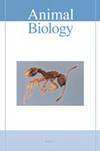Revisiting classic ecogeographical rules, using a widely distributed mouse species (Apodemus draco)
IF 0.9
4区 生物学
Q2 ZOOLOGY
引用次数: 2
Abstract
Ecogeographical rules predict an association between specific adaptive morphological/physiological traits and latitude, elevation or cooler climates. Such ecogeographical effects are often expressed most clearly in widely distributed species due to continuous selective adaptation occurring over their geographic range. Based on 40 population sampling sites of 116 adult individuals (female, ; male, ) across an elevational range of 191–2573 m, we tested whether morphological traits accorded with predictions of Bergmann’s rule, Allen’s rule and Hesse’s rule for the South China field mouse (Apodemus draco). The effects of elevation on body size, appendage length and heart size were tested by fitting Linear Mixed-Effects Models. None conformed to Bergmann’s, Allen’s or Hesse’s rule. Clines in body size opposed Bergmann’s rule, and foot and snout length ratios opposed Allen’s rule. We conclude that South China field mice, a widely distributed species, exhibit an acute thermoregulation mechanism in which in colder conditions body sizes decrease – as opposed to altering heart sizes or surface area to volume ratios – requiring less energy to regulate body temperatures. Also, there was a stronger selective pressure to increase partial appendage lengths (i.e., foot and snout) to adapt to the specific environment (e.g. longer period of snow cover, up to 2573 m) rather than on a general shortening of appendages to cope with colder conditions.重新审视经典的生态地理规则,使用广泛分布的老鼠物种(Apodemus draco)
生态地理规则预测了特定的适应性形态/生理特征与纬度、海拔或凉爽气候之间的联系。由于在地理范围内不断发生选择性适应,这种生态地理效应通常在分布广泛的物种中表现得最为明显。基于海拔191–2573m范围内116只成年个体(雌性,;雄性,)的40个群体采样点,我们测试了华南野鼠(Apodemus draco)的形态特征是否符合Bergmann规则、Allen规则和Hesse规则的预测。通过拟合线性混合效应模型来检验海拔高度对身体大小、附肢长度和心脏大小的影响。没有一个符合伯格曼、艾伦或黑塞的规则。Clines在体型上反对Bergmann的规则,而脚和鼻子的长度比例则反对Allen的规则。我们得出的结论是,华南野鼠是一种分布广泛的物种,它表现出一种急性的体温调节机制,在较冷的条件下,体型缩小,而不是改变心脏大小或表面积与体积的比例,需要较少的能量来调节体温。此外,增加部分附肢长度(即脚部和鼻子)以适应特定环境(例如更长的积雪期,高达2573米)的选择性压力更强,而不是为了应对更冷的条件而普遍缩短附肢。
本文章由计算机程序翻译,如有差异,请以英文原文为准。
求助全文
约1分钟内获得全文
求助全文
来源期刊

Animal Biology
生物-动物学
CiteScore
2.10
自引率
0.00%
发文量
34
审稿时长
3 months
期刊介绍:
Animal Biology publishes high quality papers and focuses on integration of the various disciplines within the broad field of zoology. These disciplines include behaviour, developmental biology, ecology, endocrinology, evolutionary biology, genomics, morphology, neurobiology, physiology, systematics and theoretical biology. Purely descriptive papers will not be considered for publication.
Animal Biology is the official journal of the Royal Dutch Zoological Society since its foundation in 1872. The journal was initially called Archives Néerlandaises de Zoologie, which was changed in 1952 to Netherlands Journal of Zoology, the current name was established in 2003.
 求助内容:
求助内容: 应助结果提醒方式:
应助结果提醒方式:


